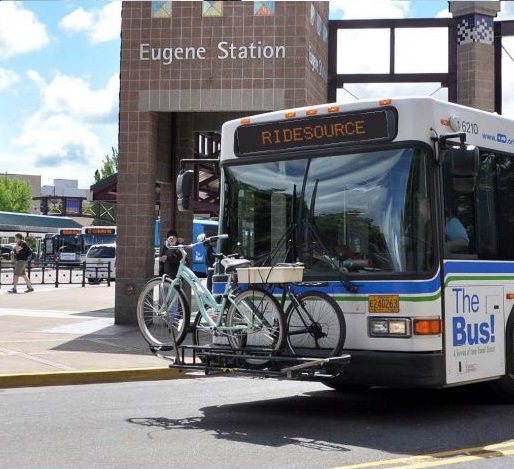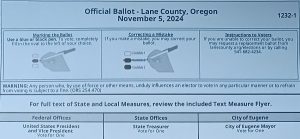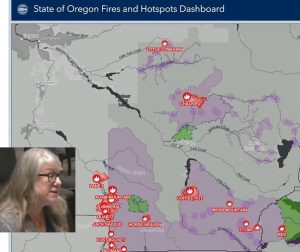Neighborhoods urge support for LTD drivers as union describes high turnover and forced overtime
8 min read
The Neighborhood Leaders Council Transportation committee met April 28. Participants talked about a meeting with union officials representing LTD bus operators.
[00:00:13] SEN Transportation Chair, Jess Roshak: So this is the NLC neighborhood transportation meeting monthly Thursday night, April 28. And we’re going to do a share out to update each other on what’s going on in our respective parts of the community or committees that we’re on. So that we’re all in the know.
[00:00:30] Southeast Neighbors Transportation met with John Gangl and Bill Bradley. They are not appropriately staffed for this level of service and the people are leaving faster than they can be hired. They’re being put on the back burner by LTD beefing up administrative positions while cutting back on all the driver, customer service, and public safety positions.
[00:00:57] And so you’ve got a lot of unhappiness and overstretched people who are being asked to work six out of seven days a week and take on 12-hour shifts, or sometimes work shifts where they only have seven hours in between them. And it’s very, very stressful to be a bus driver at this point in time for LTD.
[00:01:17] There are a lot of demands being placed on the bus drivers. They’re not salaried, they’re hourly. And I had made the comment in the LTD budget meeting a couple of weeks ago that, there are $21.43-an-hour bus drivers being hired, and these are their most important employees that everything rides on the back of. And yet they are among the lowest 10 percent in pay at the (Lane Transit) District. They are making overtime for all the extra hours that they’re being called in and it’s good over time, but I think that they are not happy because there’s no life balance. They’re being asked to do too much.
[00:01:58] Linda Duggan: When COVID hit, LTD decreased the bus drivers and the other cities like Salem and Portland kept the same level of bus drivers and then they’re not having the problems that LTD is, of not having enough bus drivers and training them and getting the routes up to what they were. And so they felt like that was a big mistake.
[00:02:23] If they’re forced overtime, they get one and a half. If they volunteer to do overtime, they get the double pay. But if you don’t take the overtime shift, the first time is like a minor slap on the wrist and two times, you’re really in trouble if you refuse. And they actually are being forced to do overtime and they did say, one of them had eight hours between shifts and the other one said maybe 10 hours at the max between shifts. And I said, ‘You mean to eat and sleep?’ I mean, it was like, that’s incredible.
[00:03:06] Jess Roshak: And there were other complaints. Their main one is on public safety and on the EmX routes, there’s a lot of safety issues with the routes themselves, they had complaints in terms of where the stop is versus where the people making right hand or left hand turns in front of where the bus has stopped. They call West 11th ‘The Career Killer.’ It’s dangerous to drive that route. You have to be at the top of your game—being overstretched and tired on an EmX route is not a favorable thing.
[00:03:40] And yet LTD is staffed up on all the rest of the positions that are behind the scenes. I don’t have my budget in front of me, but Business Services, I think they, like, tripled their department and that’s things like marketing, while the bus drivers are down to their lowest level since way before the pandemic. They’re at, like, 186 drivers, so they don’t have subs or relief.
[00:04:04] Their contract is up on June 30th. And so one of the concerns is, that the board has not been given a presentation yet on contract negotiations. They’re supposed to be briefed on the union. Apparently they haven’t been yet.
[00:04:20] John Q: Jess serves on the LTD Budget Committee and often attends board meetings.
[00:04:24] Jess Roshak: The thing that’s struck me as odd is that the drivers often have to make public comment at the meeting. Have you noticed this? They’re marginalized where it’s never embedded into an agenda, where maybe the drivers have communications that they want the board to hear. They line up like the rest of us in an LTD meeting and make a public comment.
[00:04:48] I think certainly I will be advocating for bus drivers, or at the very least the union reps, to have a spot on the agenda at LTD board meetings. They deserve their voices to be heard. And not just that, but if you’re on the board, you would want to hear what the drivers have to say. And so they’re feeling like there’s physical and psychological barriers that they put up between ‘boots on the ground’ operations—what’s really happening—and all the rest of it.
[00:05:20] The bus drivers really want to get away from what they call ‘The Pulse.’ And The Pulse is where all the buses leave the station. If you miss a bus, you’re toast for the next 45 minutes until the next round of buses leaves the station. So the drivers would really love to get away from that model, and they said that there is a loop-like model in Springfield on Routes 17 and 18 and maybe 66 and 67 that are doing loops and delivering to Thurston Station.
[00:05:55] And they made a note that Jarrett Walker had designed a plan for Salem that Salem implemented and then like a year later, Salem rescinded it and took it back—
[00:06:05] Linda Duggan: Because it wasn’t working.
[00:06:08] Jess Roshak: Neighborhoods should be aware that their comprehensive service analysis is going on this year—watching the routes, seeing how many people are riding them. The bus drivers mentioned that that’s backwards because service is still down. Enough bus drivers haven’t been hired back on or kept in order to get service levels back up. It’s the cart before the horse, monitoring ridership—you’re killing it by not getting service levels back up. So watch out for that.
[00:06:38] And to really advocate at these meetings that they keep hiring more bus drivers. (LTD General Manager) Mark (Johnson) said that he’s satisfied with the number of bus drivers they have. And it doesn’t sound like that is what everybody else thinks who’s driving the buses and it doesn’t seem like it’s enough for adding back the service necessary to get a real great picture of what services we’re going to need going into the future, the comprehensive service analysis.
[00:07:07] And we need, we actually need, increases to our service, not just staying the same or decreasing, because of driver issues.
Linda Duggan: And safety too, because they told some pretty incredible stories about what happens on the bus.
[00:07:22] Jess Roshak: They are both very well-spoken and both very intelligent guys, and are committed to bus service being a utility for our community, and I can’t speak highly enough about both of them. And they encouraged the neighborhoods to reach out via email or their phone numbers.
[00:07:44] Active Transportation advocate Steve Abbott: I participated this last Sunday with the 350 Eugene’s ‘Electrify.’ It’s about moving away from natural gas and toward electrification. Good turnout, good weather.
[00:07:55] Charlie and Marty and a bunch of folks were there with their EVs. I was there with my bike group, Climate Revolutions By Bike, with our plugin bikes, trying to promote the idea that EVs aren’t the only solution, that biking and walking is a very important component.
[00:08:08] The other thing that I’ve pushed the City on: In their Climate Action Plan, there were several electrification planks. They had a task, ‘Come up with a strategic plan for where should there be charging infrastructure in the public right of ways.’ In my mind, strategic plans are things that you do first, right, not last. But it’s the hardest thing to do. So we should be pushing for charging stations in highly public, highly visible public locations because that visibility drives adoption.
[00:08:35] And wherever you advocate for plugin for bikes would also need to be very secure parking, ‘parking cage,’ I guess they call them.
And so that was all great.
[00:08:44] There is a lot going on coming up in May. May is Bike Month, always generates a lot of biking activity. And so I would just encourage folks if they haven’t dusted off their bikes since winter started, this is the opportunity to go to the city website or the county website, ‘May is Bike Month,’ and look at all the great activities that are out there for you.
[00:09:05] Jess Roshak: Our committee is of the thinking that Amazon Station would be a really awesome place for charging. We’re trying to get that more of a transportational hub for the area and to have that right off I-5, it’s in the heart of South Eugene, at the cusp of Downtown, and you’ve got the bike program going down there now, you’ve got car shares from there, you’ve got carpooling leaving from there, so it could be a really strategic place for that.
[00:09:32] So many people utilize that and you could charge and use the park and use the community center and the pool and the playgrounds and the dog park, and walkable to shops and all sorts of good stuff and get on the bus.
[00:09:44] We’re really excited about electrification at Amazon Station, making more of a push for frequent bus service to be going in and out of there. Right now it’s infrequent bus service, there’s a trickle of folks, and LTD says that the population doesn’t support improvements to the station. But the population is the same as what’s around Hunsaker. It’s roughly as densified.
[00:10:11] And the union drivers report that they would really love to use those bathrooms there, because there’s not enough places for drivers to go to the bathroom on their routes and those have been locked apparently for years, but they’re bathrooms that were initially built for the drivers to go. And they don’t have places.
[00:10:31] John Q: Jess said the City is re-booting its Smart Trips program, Andrew Martin from LTD is chatting this week about mobility management, and the board will hear a pitch for more accessibility.
[00:10:41] Jess Roshak: There’s going to be a presentation about Ride Source. If they can service people who might take Ride Source by increasing accessibility at bus stops and frequency and the quality of service through the regular bus network, it’s a lot less expensive.



